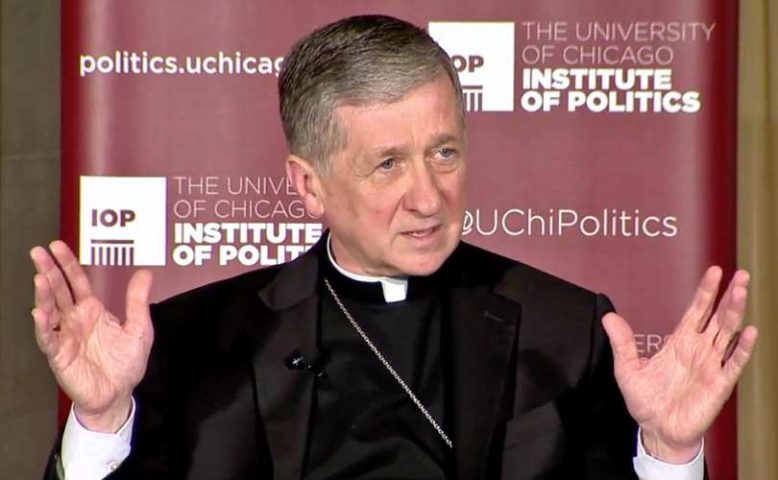 CAMBRIDGE, United Kingdom, February 9, 2018 (LifeSiteNews) – Amoris Laetitia is “nothing short of revolutionary,” a “hermeneutical shift,” and is “[forcing] a paradigm shift” in Catholic practice, Cardinal Blase Cupich said today.
CAMBRIDGE, United Kingdom, February 9, 2018 (LifeSiteNews) – Amoris Laetitia is “nothing short of revolutionary,” a “hermeneutical shift,” and is “[forcing] a paradigm shift” in Catholic practice, Cardinal Blase Cupich said today.
Cupich told this to the Von Hügel Institute for Critical Catholic Inquiry at Cambridge University today and made additional brief comments about it to the dissident National Catholic Reporter.
Pope Francis’ letter to Argentine bishops approving their interpretation of Amoris Laetitia “offered a pathway forward” in regards to unrepentant adulterers being given Holy Communion, Cupich said.
Notably, the publication of “in Acta Apostolica Sedes of his letter to the bishops of Buenos Aires…confirms that their interpretation of Amoris authentically reflects his mind as being official Church teaching,” he said. “It will now be up to all in the Church … to respond in a spirit of affective and effective collegiality with the Successor of Peter.”
Because the Catholic Church teaches that Holy Communion is the literal body, blood, soul, and divinity of Jesus Christ, only practicing Catholics in a state of grace may receive it. Therefore, the Church has always taught that someone who unrepentantly persists in sin – such as sleeping with someone who is not their spouse – should not receive it.
Cupich implied that the Catholic Church’s traditional teachings and pastoral practices have been inadequate. He said sometimes “the voice of God” will tell people to continue living in situations that do not meet the moral “ideal.”
‘New direction’ of ‘accompaniment’
According to the cardinal, Amoris Laetitia rejects “an authoritarian or paternalistic way of dealing with people that lays down the law, that pretends to have all the answers, or easy answers to complex problems, that suggests that general rules will seamlessly bring immediate clarity or that the teachings of our tradition can preemptively be applied to the particular challenges confronting couples and families.”
“A new direction will be required, one that envisions ministry as accompaniment,” said Cupich. This “accompaniment” will be “marked by a deep respect for the conscience of the faithful.”
He condemned “pretending to have a general rule that’s going to satisfy every particular case” about people living in invalid sexual unions receiving Holy Communion.
Instead, Cupich said, “I think that accompanying means first of all that you have to get to know the person and walk with them. It would be against the accompaniment model of ministry if in fact you began to speak about particular questions in general ways.”
‘Doctrinal development’
Cupich argued that the radically changes the Pope has instituted through Amoris Laetitia are in fact a fruit of “doctrinal development.”
“Doctrinal development is about remaining open to the invitation to see our moral teachings on marriage and family life through the lens of God’s omnipotent mercy,” he said. “Doctrine can develop as a result of the Church’s merciful accompaniment of families because God has chosen the family as a privileged place to reveal all that the God of mercy is doing in our time.”
“To deny this, the Holy Father warns, would make us guilty of the ‘worst way of watering down the Gospel,’” Cupich ironically warned. Critics of Amoris Laetitia say it majorly “waters down” the Gospel by undermining the Sixth Commandment.
If people look at the “whole document” and the “principles of interpretation” called for by Pope Francis, and follow “where the paradigm shift goes…then you’re going to be able to have a means by which you can deal with particular cases, rather than pretending to have a general rule that’s going to satisfy every particular case.”
The principles in Amoris Laetitia “force a paradigm shift,” Cupich said.
Vatican Secretary of State Cardinal Pietro Parolin made nearly identical comments recently about the exhortation representing a “new paradigm” in the Church.
Those comments earned a strong corrective from St. John Paul II’s biographer, George Weigel. “The Catholic Church doesn’t do ‘paradigm shifts,’” Weigel responded in a searing First Things essay.
The approach of Pope Francis in the controversial exhortation, about which the pontiff has not answered formal questions on its compatibility with Catholic morality, “involves creating a culture of care, hospitality and tenderness in the parish community on behalf of those who have been wounded,” Cupich said.
Catholic leaders need to find “a new way of relating to the lives of families today,” Cupich said, and the Catholic hierarchy need “to respond in a spirit of affective and effective collegiality with the Successor of Peter.”
Implying Amoris Laetitia is part of the “authentic magisterium,” Cupich cited the Vatican II document Lumen Gentium, which says: “Submission of mind and will must be shown in a special way to the authentic magisterium of the Roman Pontiff.”
Individual conscience “demands a profound respect for the discernment of married couples and families,” said Cupich, who has previously said Holy Communion for pro-abortion politicians can be a good thing.
People’s “decisions of conscience represent God’s personal guidance for the particularities of their lives,” said Cupich. This means that “the voice of God…could very well affirm the necessity of living at some distance from the Church’s understanding of the ideal.”
This is “not relativism, or an arbitrary application of the doctrinal law,” he claimed, “but an authentic receptivity to God’s self-revelation in the concrete realities of family life and to the work of the Holy Spirit in the consciences of the faithful.”
Cupich cited the Vatican II document Gaudium et Spes to defend his claims that individual “conscience” needs to be given more prominence.
“Conscience can do more than recognize that a given situation does not correspond objectively to the overall demands of the Gospel,” Cupich said. “It can also recognize with sincerity and honesty what for now is the most generous response which can be given to God, and come to see with a certain moral security that it is what God himself is asking amid the concrete complexity of one’s limits, while yet not fully the objective ideal.”
He continued:
The starting point for the role of conscience in the new hermeneutic is Gaudium et Spes 16 (2), which identifies conscience as “the most secret core and sanctuary of a man…(where) he is alone with God, Whose voice echoes in his depths.” When taken seriously, this definition demands a profound respect for the discernment of married couples and families. Their decisions of conscience represent God’s personal guidance for the particularities of their lives. In other words, the voice of conscience—the voice of God— or if I may be permitted to quote an Oxford man here at Cambridge, what Newman called “the aboriginal vicar of Christ”—could very well affirm the necessity of living at some distance from the Church’s understanding of the ideal, while nevertheless calling a person “to new stages of growth and to new decisions which can enable the ideal to be more fully realized” (AL 303).







